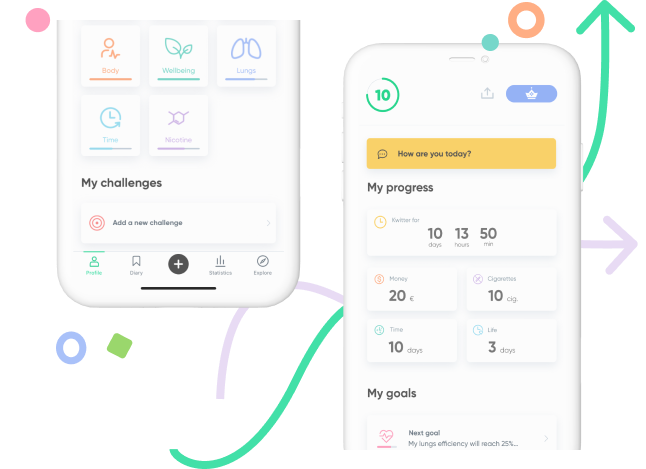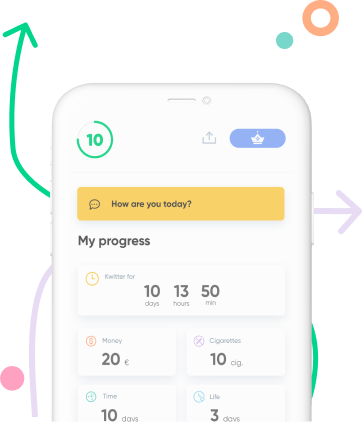
You’ll soon be back to your former self or even become a better version of yourself, fitter, happier and healthier.
Stress is often associated with negative situations or negative emotions. However, stress can be felt in situations that bring us happiness, such as the birth of a child, marriage or a promotion to work. Since it is difficult to recognize both the situations and emotions that make you want to dive back, we will talk about stress in general terms.
Stress is a sensation, usually temporary, that arises as a result of a change. Something changes in our body or our environment, and it produces stress that pushes us to put set up strategies to adapt to this change.
Why should I learn to manage stress?
These coping strategies are often effective, at least temporarily: they allow us to find our balance. However, some are not adapted to our long-term well-being, such as tobacco consumption. Stress management is therefore a key element in any smoking cessation process. Tobacco use is no longer a way for you to manage your stress, so in the new life you want to live, you will need to learn new stress management strategies.
My stress level is abnormally high since I quit smoking, why?
When you’re stressed, the urge to smoke can be particularly intense. On the one hand, you are experiencing a situation that is changing your balance. Your organization pushes you to find a strategy to adapt. On the other hand, the strategy that automatically comes to your mind (that of taking a cigarette) is not adapted to the person you want to be. So there are two changes that can cause more intense stress. Learning to manage your stress by identifying new ways to deal with it will help you overcome withdrawal symptoms.
With some tools and more practice, you will learn to surf the wave instead of being overwhelmed by it. Indeed, stress as such will not disappear from your life, it will always be part of it! However, these stressful situations will no longer be associated with smoking but with your ability to implement strategies adapted to the person you want to be.
During your smoking cessation, you can have the impression that you feel twice as stressed: this is normal! And it's just a feeling, so it's temporary!
Your body reacts to the sudden lack of nicotine and the thousands of chemical products you inhaled via the cigarette smoke. This recovery phase creates its own stress which adds to usual stressful situations you can face on a daily basis, at work for instance.
Luckily, this doesn’t last long and it’s only temporary. But though this is a brief period of time, it can be enough to provoke a relapse. To support you and help you through this phase, Kwit defined 3 steps which will help you manage your stress without cigarette.
The first step before starting a change is to clearly and precisely define your goal.
It's up to you to choose your objective! We offer you the SMART technique to help you define it.
It includes five levers that allow you to achieve your goal: Specific - Measurable - Achievable - Realistic - Timely defined.
Specific
Your objective must be clear and specific. The goal in managing stress without cigarettes can be variable. Often, it is to stop smoking completely, but it can also be to reduce your consumption, or to abstain in certain places, such as public places, and/or in front of certain people, such as your children.
Measurable
Change is a process that requires many resources and a different use of your energy. Motivation can be blurry at times and small progress is difficult to see. You need to report your progress objectively in order to see the impact of all your efforts. In some situations, the use of Kwit can be of great help, especially because it allows you to realize how beneficial your efforts are on different aspects of your life. This keeps your motivation and energy up when the cravings are strong.
Achievable
It may seem obvious that it is necessary to set objectives that are possible to achieve. Otherwise, it can create frustration and a sense of disability. Often, we set ourselves unattainable goals. An example? Living without stress or no longer feeling emotion.
Often, the path to reach a goal requires going through steps or mini objectives. These steps must be identified and time taken to create the good conditions that facilitate their achievement. The previous reflection on alternative strategies that can be adapted to the person you want to be is part of this lever.
Realistic or relevant
take the time to recognize your own and personal values. How does quitting smoking, in stressful situations, allow you to be the person you want to be? It gives you back control of your life, you have a sense of freedom, you take care of yourself and your loved ones through this decision?
Temporarily defined
The objective of tobacco-free stress management must be part of your life calendar. As with any change, you should plan time to prepare for the cessation by implementing strategies that you wish to use on a regular basis.
To learn how to manage stress without tobacco, you need to understand your addiction and the link you have made between smoking and stress reduction. Understanding this link is important for identifying more effective and less dangerous ways to effectively manage your stress.
Maybe one of the reasons why you smoked was that you found it relaxing. Indeed, nicotine releases a chemical substance called the dopamine which brings a sensation of well-being, makes you feel more comfortable and more relaxed and gives you the impression that your stress fades away. Yet, this feeling of well-being is short-lived as the stress comes back slowly but surely a few minutes after the last inhalation. Actually, it is the cigarette that provokes your stress. You try to relax by feeding this addiction. It is a vicious circle that proves difficult to break, especially when you try to stop smoking for good.
What causes stress?
To learn more about this link, make a brief introspection. What generates stress can be an external stimulus (a bear in a forest, a meeting at work, the birth of a child) or an internal stimulus in the form of thoughts ("am I a good parent? », "I will probably miss my exam") or feelings (hunger, lack of sleep, emotions in general). What is external is often easier to spot than internal stimuli. The more you are able to understand the circumstances of your stress, the better you will be able to find new strategies to manage it without cigarettes.
It is important to understand what, in your case, causes stress, in order to be prepared to ride the wave. So to overcome these feelings in a positive way while remaining a non-smoker, you can learn new techniques to implement depending on the situations and needs that cause you stress.
Kwit helps you identify stressful situations and emotions that make you want to smoke. There are some things that can surprise you, by the nature or intensity of the stress they cause. Identifying and understanding these situations will already help you anticipate and implement these new strategies.
Managing stress does not mean ignoring or avoiding the situations that generate it.
Stress is part of life. There is no way to avoid it completely, but we can all learn how to react to stressful events, situations or emotions. Stress can present under various forms without being necessarily negative. What is stressful for a person may not be stressful for another one. Anyhow, stress and emotions communicate a change in our environment and body. Ignoring or avoiding these feelings and the information they provide is not effective, since they are there to allow us to adapt as well as possible to the situation we are experiencing.
Accept the fact you are a human: you can feel a wide array of human emotions. The symptoms of the cessation will make you feel sad, stressed, anxious, angry and each new step towards a tobacco-free life will make you proud, excited, relaxed and, most of all, happy.
You can manage your stress, you already did it! You had to deal with it before you started smoking, and you are able to manage it without the cigarette. Think about how you did in a stressful situation when you were young for instance.
Instead of ignoring the stress, use it! The anger, the stress and the cravings for a cigarette can, often, manifest themselves as physical energy. Don’t let your stress paralyze you, let it galvanize you (do some physical exercise). Use these moments of stress to do these things you don’t usually have the courage to do when you are calm. The goal is to convert these situations when the craving is strong into a positive experience in order to make it more tolerable.
To help you, we have identified several ways to manage your stress you can put into practice as soon as stress breaks through.
Use cardiac coherence to localize your stress and relax
Your body reacts to stress by releasing hormones that increases your heart rate and your blood pressure. Take a minute to understand how stress affects your body. Where do you feel tensions in your body? Finding ways to reduce this tension will also help you reduce your mental stress. Stretching can help you release the accumulated tensions. Stretch. Muscle tension is often a sign of stress. Take the time to get up, stretch your legs, your neck and your whole body. Take a slow, deep breath through your nose, then through your mouth. You will feel your whole body slowly unwind. You can pair this activity with some meditation.
Visualize calm and well-being in order to feel them
Think about a place where you feel safe, at ease and relaxed. Imagine it as clearly as you can, including what you would feel, hear or even smell if you were in this relaxing place. Breathe calmly and keep breathing until your respiration slow down and your stress diminishes.
Use this energy to do some sport
Physical activity helps improving your mood and reducing your stress. Sometimes, a short walk is enough to relieve your stress. And walking is free! You find walking boring? Go for a bike ride, do some boxing or play badminton! It is proven that physical activities relieve stress and galvanize the body, so go for it!
Don’t keep your stress to yourself
You shouldn’t be alone when facing your stress. Share your feelings with your friends, family and all your near relations in general. They will be happy to help you stay non-smoker and say no to cigarette! Don’t be afraid to ask for a little support. Speak to a friend (or a pet, they are excellent listeners!) will take your mind off things and your stress will diminish.
Live in the present
Focus on the present and don’t worry about the last-minute reunion planned tomorrow, don’t overthink about this crucial meeting in a week; put aside all those “what if” questions. Live in the present and try not to worry about what is to come. Rather try to focus on what is going on now and not on what you will probably face in the future.
Find an activity that you find relaxing
Have some fun! Find a hobby or an activity that you like. Here are some examples: do some gardening, take some pictures, do some cooking, spend an hour (or ten… at Kwit, we won’t judge you) on Netflix, play video games, do some knitting, take a shower, color some relaxing drawing… You don’t have the time for these activities? We can also propose some things you can do everywhere: listen to music, use a stress ball (or an stress-relieving item).
Use Kwit!
Playful, original, caring and guilt-free, Kwit is a mobile application that support you throughout your smoking cessation, including during the stressful moments when the desire to relapse is high.
Kwit allows you to follow your progress and to celebrate all your achievements. To preserve your determination, you will have access to very useful statistics such as the time spent since the last time you smoke, the money you saved and the number of cigarettes you didn’t smoke. All these statistics will allow you to think twice before lighting a cigarette, even during a very stressful moment.
If you need a piece of advice to face the craving for a cigarette, shake your phone! A motivation card will appear to encourage you and boost your motivation. You can resist, even in stressful situations: trust in yourself!
Stress has made you so restless that cigarette is your only possible source of relief? Don’t panic! All is not lost, you have the right to trip. All your efforts are not vain: on the contrary, you now know which moments are likely to make you relapse. Understand your emotions in such situations and analyze them to overcome your cravings the next time: this is what Kwit offers.
Start my 7-day free trial!
You have what it takes to manage your stress! Refine your strategies with the knowledge you have of yourself in stressful situations. Any process of change and learning takes time, so don't be hard on yourself: you are human and smoking cessation is an ordeal that requires a certain amount of energy. At Kwit, we usually say that every former smoker is a superhero who has accomplished a real feat. Celebrate your successes and accept your weaknesses; this will make you strong.

